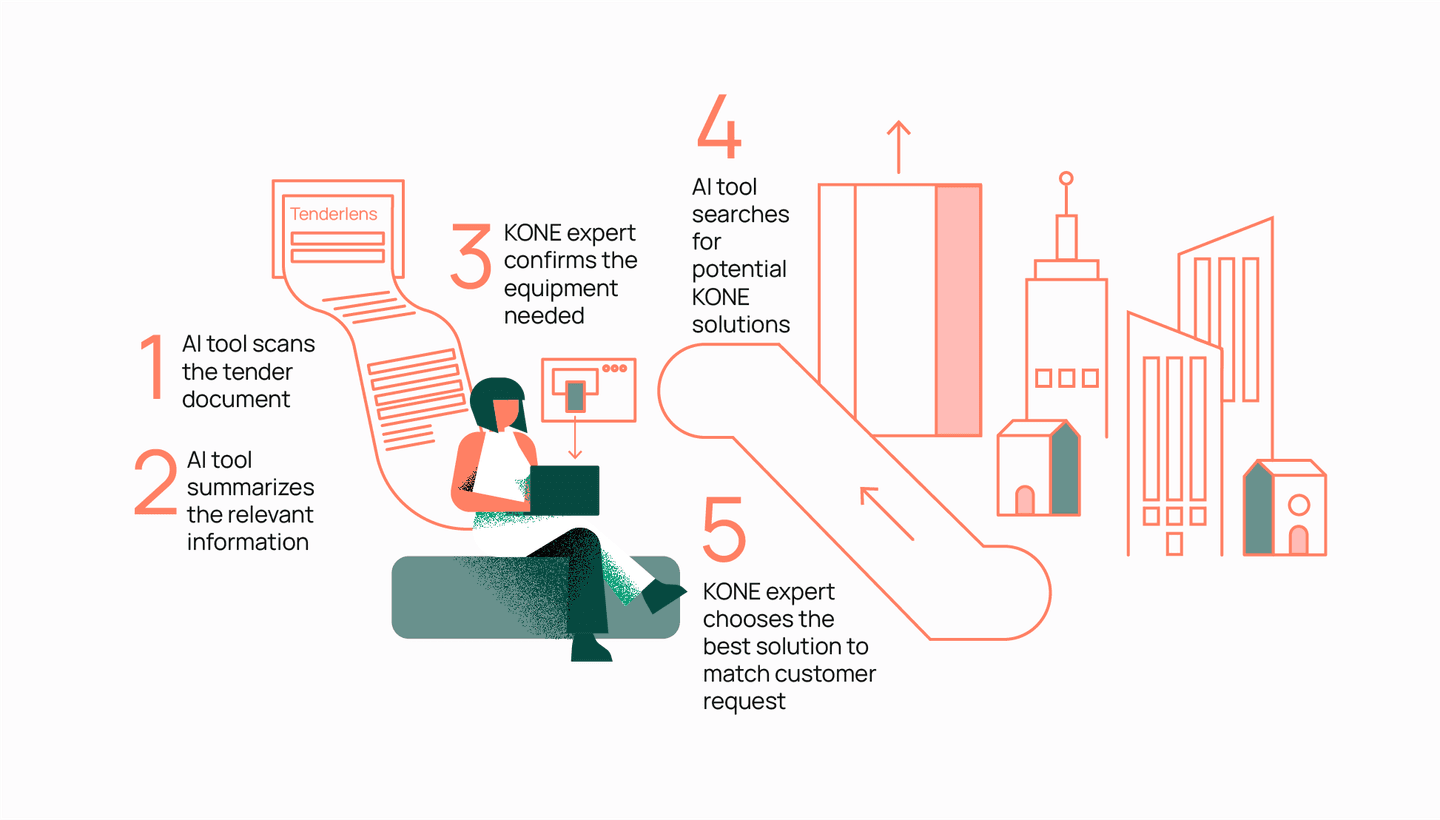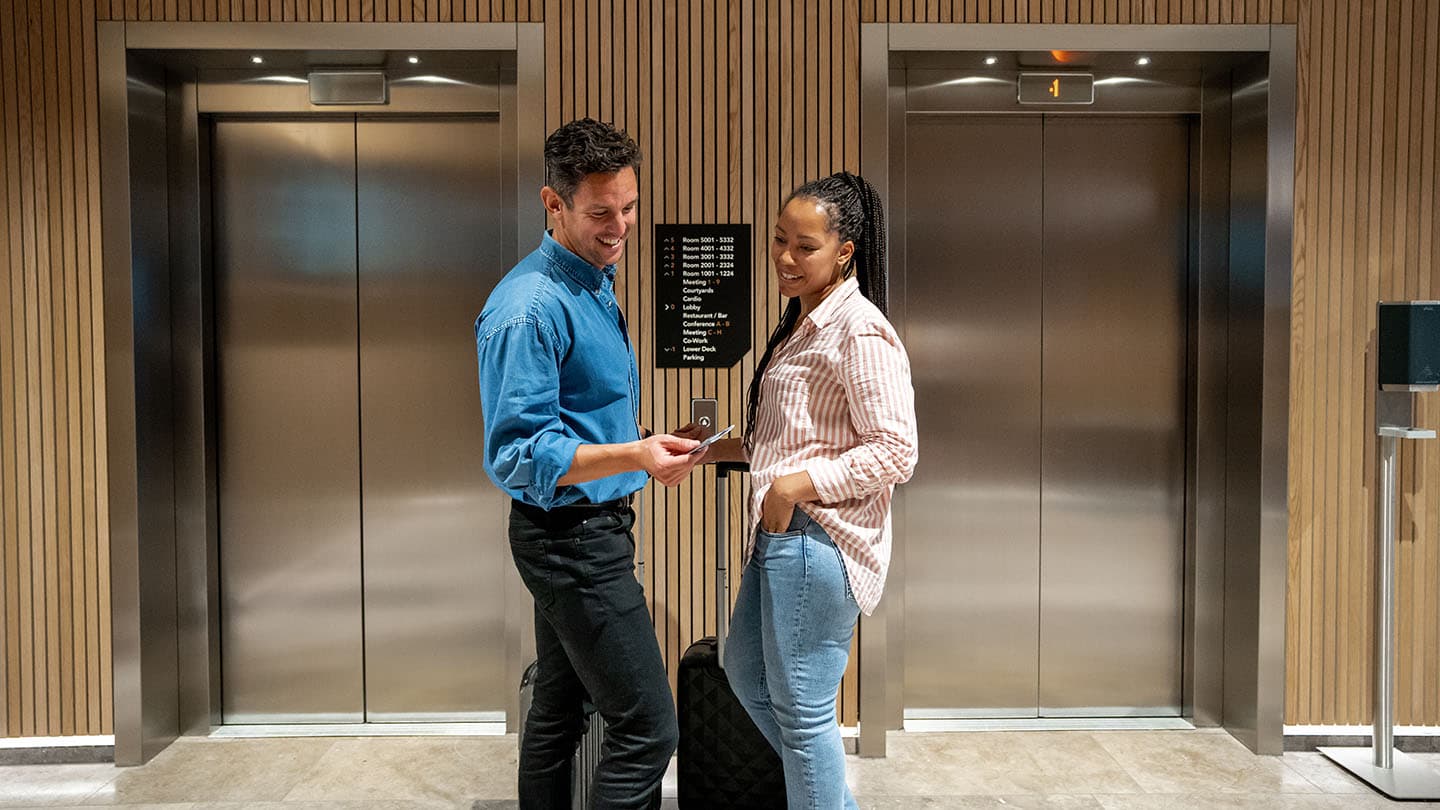KONE: Driving down sales cycle time with GenAI and lean process redesign
Together with Futurice, KONE co-developed TenderLens, a tool that harnesses generative AI to automate manual work, reduce the sales cycle time, and free up sales teams for more value-adding tasks. After piloting TenderLens successfully since early 2024 in the United Kingdom, Finland, the United Arab Emirates, Egypt, Qatar, and Bahrain, KONE has started to deploy the solution globally.

Data approaches used
- Natural language processing
- Large language models
- Advanced prompt engineering
- Structured information extraction
- Entity recognition
- Binary classification
- OCR (Optical character recognition)
- E2E system evaluation
The challenge
KONE, a global leader in the elevator and escalator industry, receives numerous sales requests from contractors, vendors, and customers on a weekly basis. Clients often seek the right equipment at optimal prices in tight timelines, and with significant investments at stake, they need to be able to make quick and informed decisions.
The resulting sales process is complex, with many people and handovers involved, resulting in long cycle times. Compiling a proposal can take weeks to months in the most complicated cases.
Customer requests come in various formats - emails, phone calls, texts - with no standardized data structure. Kone sales experts then have to review and extract complex, technical information in tenders that are typically more than 100 pages long.
The process requires significant manual effort, double-checking facts and industry standards with multiple revisions with several experts. This all takes time away from what's most important – which is working with the customer to find the best possible solution.
Our work with Futurice has been efficient. The collaborations inspired us to reimagine our internal workflows and pushed us forward in our own process thinking, encouraging us to think 'outside-the-box' and implement new ways to the tendering process.
What we did
Overall, our goal has been to systematically reduce complexity and drive down the cycle time of the process, utilizing gen AI and lean process thinking.
After analyzing where the biggest pain points in the process were, we began with a proof of concept (PoC) to test the feasibility of using generative AI to extract elevator and escalator-related data from complex tender documents. Through this, we could concretely demonstrate the technical feasibility and business case to support further development.
Once the PoC proved viable, we moved to a more iterative development process to build what is now called the TenderLens solution. We worked in short sprints, continuously testing the solution's accuracy and potential impact. This meant setting up a robust technical evaluation and working closely with the KONE sales teams to gather feedback with every step forward. The 'feedback-iterate-feedback' approach allowed us to fine-tune TenderLens's performance and the user interface based on real-world usage.
Tweaking the LLM model was initially manual – the input and out part. However, after the 'eureka moment' came, the data science team figured out how to break the problem apart into several bite-sized pieces, resulting in the exact data output.
Afterward, the sales team could review and correct outputs and ensure all information was 100% accurate. This “human-AI collaboration” approach guaranteed high-quality results while automating much of the repetitive work.
In AI development, uncertainty is inherent. We can't foresee all outcomes, so we must work closely with users. Build, test, get feedback, and repeat. This allows us to gradually shape the AI's capabilities, adapting to unexpected outcomes.
We also tackled the challenge of integrating TenderLens with KONE's existing systems: their Configure Price Quote (CPQ) system and Salesforce CRM, building it into a unified end-to-end (E2E) flow where the data extracted by the AI flows directly into their sales process.
Throughout the project, we focused on UX design, regularly interviewing sales teams to understand their needs in the most possible depth – how they like information to be displayed, what features brought them value, and what would encourage them to use TenderLens, based on their frequent interactions with customers. Recognizing that technology means nothing if people don't want to engage with it, we encourage a change in process thinking and redesign ways of working throughout the process.

Why it matters
TenderLens started with the vision of accelerating sales cycles that previously took days and even months to be completed in hours. Soon after its initial deployment, the AI solution had a positive impact on KONE's sales operations. Salespeople reported that the tool saved them several hours per document, enabling them to focus on tasks that need human reasoning, such as more complex product configurations and more strategic, client-facing activities such as relationship-building and deal-closing.
Accuracy also improved. The AI system delivered over 90% accuracy in extracting data from the documents, reducing human error and ensuring consistent data quality. This boosted the document reviewing process and also improved the reliability of the data for further process steps.
As the extracted data flows directly into Salesforce CRM, TenderLens complements the existing customer and deal management processes, enhancing productivity without changing the way sales teams already work.

From a cost perspective, leveraging the latest GPT-4 models allowed the company to quickly implement a robust solution without needing expensive custom model development. Over the past 12 months, the cost of operating these models decreased by nearly 80%. This was largely due to rapid advancements in AI technology, which improved cost efficiency without needing dedicated cost optimization efforts.
TenderLens also laid the foundation for experimentation with AI and potential to improve efficiency and thus bring long-term value to KONE. Designed to be flexible, the solution could be expanded across different regions and adapted to handle additional types of documents in the future, allowing the company to start applying AI in other areas of the sales process.
User feedback has been positive: in the pilot phase, the users rated the tool's ease of use as 4.3 out of 5. KONE’s customer facing experts and engineers have praised the tool and found it transformative for its potential for improving efficiency, ways of working and automating repetitive tasks with AI.
TenderLens showcases how generative AI can enhance enterprise-grade CRM platforms like Salesforce, turning them into true decision-support environments.
About KONE
As a global leader in the elevator and escalator industry, KONE moves two billion people every day, making their journeys safe, convenient, and reliable with smart and sustainable People Flow®. KONE's purpose is to shape the future of cities.
Photos courtesy of KONE
Contact
Get in touch
Looking for help with an idea, brand new brief or in-flight project? Drop us a line for a straightforward conversation.



